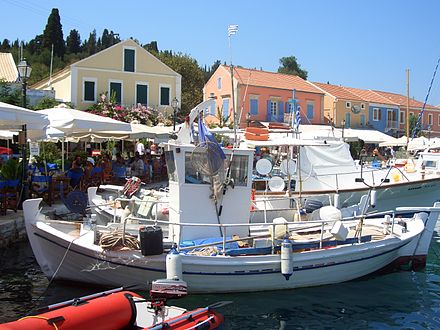Ionian Islands - group of islands in the Ionian Sea
 The Ionian Islands refers to the chain of Greek Islands stretching along the west coast of Greece in the Ionian Sea. Due to historical facts the isolated islands of Kithera and Antikythera, south of the Peloponnese, are here included in this group. These islands are traditionally called the Heptanese, i.e. "the Seven Islands" in Greek, but the group includes many smaller islands as well as the seven principal ones. The islands are well known for their beautiful sandy beaches, crystal clear waters, architecture, charming villages and stunning scenic countryside which is verdant and flourishing with greenery and nature. Each Ionian island has a distinct character. The islands are also known by their Italian names. These islands are known to be covered with green unlike the Cyclades, which is due to rareness of rain. Historically, these islands had a common fate, especially the three major islands of Corfu, Cefalonia and Zante.
The Ionian Islands refers to the chain of Greek Islands stretching along the west coast of Greece in the Ionian Sea. Due to historical facts the isolated islands of Kithera and Antikythera, south of the Peloponnese, are here included in this group. These islands are traditionally called the Heptanese, i.e. "the Seven Islands" in Greek, but the group includes many smaller islands as well as the seven principal ones. The islands are well known for their beautiful sandy beaches, crystal clear waters, architecture, charming villages and stunning scenic countryside which is verdant and flourishing with greenery and nature. Each Ionian island has a distinct character. The islands are also known by their Italian names. These islands are known to be covered with green unlike the Cyclades, which is due to rareness of rain. Historically, these islands had a common fate, especially the three major islands of Corfu, Cefalonia and Zante.
Islands
 The main islands in terms of geographical area from north to south are the following:
The main islands in terms of geographical area from north to south are the following:
-
Ereikousa
-
Othonoi
-
Mathraki
-
Corfu. the most populated island of the group. It is famous for the architecture of its capital.
-
Paxi.
-
AntiPaxi.
-
Lefkada. (Santa Maura), the island is associated with the myth of Sappho. It's most famous beach is the Porto Katsiki Beach.
-
Meganisi
-
Kalamos, the island is in the center of the inner Ionian marine protected area, the largest marine protected area in Greece
-
Kastos
-
Megalo Fermekoulo
-
Mikro Fermekoulo
-
Atokos
-
Echinades group of islands
-
Ithaki (Val di Compare) , the island is mostly known as the home of Odysseus.
-
Kefallonia (Cefalonia), the biggest island of the group. It is famous for its beaches and especially for Myrtos Beach.
-
Zakinthos (Zante), it is famous as a nesting beach of the Loggerhead sea turtle Caretta caretta and the Navagio Beach.
-
Arpia
-
Stamfani
-
Kythira (Cerigo)
-
Antikythera — most famous for the discovery of the Antikythera mechanism, inside the historical Antikythera wreck, a Roman cargo ship full of treasure that sank here.
In the parentheses are written the Italian names of some of the islands.
Cities
Major communities throughout the islands:
- Corfu Town (Κέρκυρα, Kérkyra) – capital of Corfu Island itself and of the region
- Zante (Ζάκυνθος, Zakynthos) – capital of Zante Island
- Argostoli (Αργοστόλι) – capital of Cefalonia
Other destinations
Understand
Talk

Get in
By plane
Major airports in the region include Corfu, Kephalonia and Zakynthos. Keep in mind that many routes are seasonal. During the low season, you will need to connect via Athens.
By ferry
There are ferries to Corfu, Ithaca, Kefalonia, Kythira, Paxi and Zakynthos.
Get around
See
Do
- Terra Sylvestris, +30 6973442192. Terra Sylvestris is a grassroots non profit non-governmental organization based on Kalamos island. The organisation aims through its Kalamos and Kastos sustainable development project to materialise sustainable development through rewilding in the inner Ionian archipelago islands of Kalamos ,Kastos and their satellite islands. The organisation has a field volunteer program, through which people from all over the world can potentially volunteer and contribute to the cause of the organisation.
Eat
Drink
Stay safe
Go next
Ionian Islands
pin.gov.grDate Time:Please wait...Timezone:Europe/AthensPopulation:204,562Coordinates:38.50, 20.50
Ionian Islands
Primary administrative division